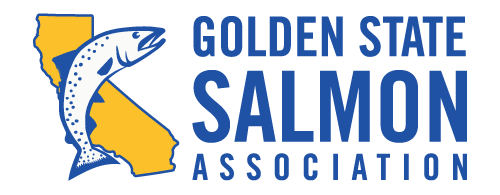Contacts:
Scott Artis, Golden State Salmon Association, 925-550-9208, scott@goldenstatesalmon.org
AMERICAN CANYON, Calif. – Governor Newsom’s Drought and Flood Trailer Bill, introduced in May 2023 and widely panned by fishing and environmental groups, received an overhaul this week as key changes were made to help gain legislative support.
The new bill included a number of key changes relative to the Governor’s proposal such as strengthening requirements as to where water can be recharged to protect water quality, slightly strengthening requirements for fish screens, improved requirements for fish screen designs, narrowed CEQA exemption to exclude desalination projects or other projects to create replacement water supplies, a January 1, 2029 sunset date, and it rejected a proposal to define storing water underground as a beneficial use. The revisions also added tighter requirements regarding which agencies can declare flood conditions that may reduce the risk of irrigation districts with conflicted motives having the authority to declare flood conditions.
“The legislature should not adopt this kind of proposal to relax pumping requirements during flood periods without any progress on an updated Bay-Delta Plan,” said Scott Artis, Executive Director of Golden State Salmon Association.
On May 16, 2023, Golden State Salmon Association voiced its opposition to the Drought and Flood Trailer Bill and testified in subcommittee meetings that it would dramatically reduce state regulation of diversions from California rivers during high flow periods. High river flows are essential to support California’s salmon runs during the juvenile outmigration period. Periods of high spring flows dramatically increase the survival of juvenile salmon. In fact, the lack of such high flows in many years is a major cause of the decline of salmon in the Bay-Delta watershed and elsewhere in California. High flows also provide other important environmental benefits including supporting chemical, biological and physical processes such as maintaining water quality and facilitating sediment movement.
“It’s totally inappropriate and especially so given the salmon shutdown and the current salmon crisis. However, the legislation is better than the Governor’s original proposal and, although it still falls short of acceptable, I thank the legislature for the improvements,” said Artis.
Golden State Salmon Association has identified lingering concerns for the State’s salmon fishery and health of the Bay-Delta in the revised trailer bill. Specifically, it fails to include operational requirements for fish screens such as approach and sweeping velocities, lacks a program to monitor for or identify environmental impacts, including impacts to fish species, has no requirement to identify any areas where near-flood conditions could provide important ecosystem values, and, most importantly, provides no limit on the number or size of new water diversions.
As a result of low populations of returning fall run Chinook adults, the 2023 California salmon fishing season has been closed for just the third time in state history. This human-made disaster has put thousands of Californians out of work and imposed severe hardships on fishing families and communities. In addition, the Central Valley winter and spring run Chinook salmon are both at risk of extinction. That risk is particularly acute for spring-run salmon. Initial counts of 2023 adult Central Valley spring run Chinook are catastrophically low. The State of California should strengthen protections for salmon runs, not weaken them.
Golden State Salmon Association (www.goldenstatesalmon.org) is a coalition of salmon advocates that includes commercial and recreational salmon fishermen and women, businesses, restaurants, a native tribe, environmentalists, elected officials, families and communities that rely on salmon. GSSA’s mission is to restore California salmon for their economic, recreational, commercial, environmental, cultural and health values.
